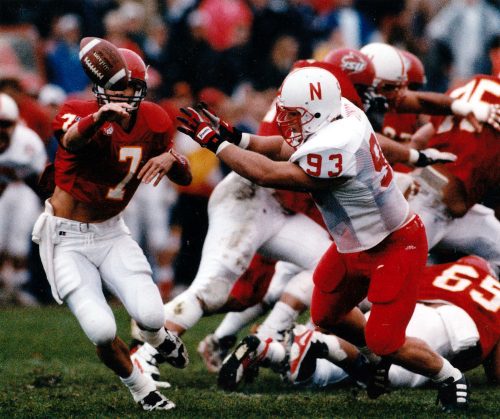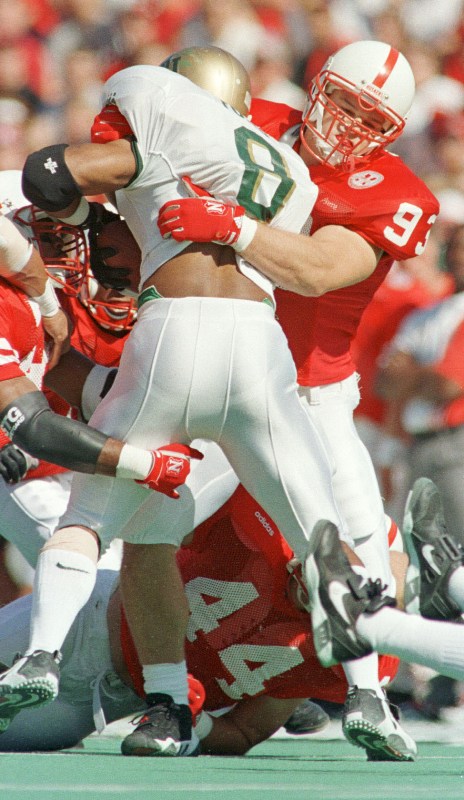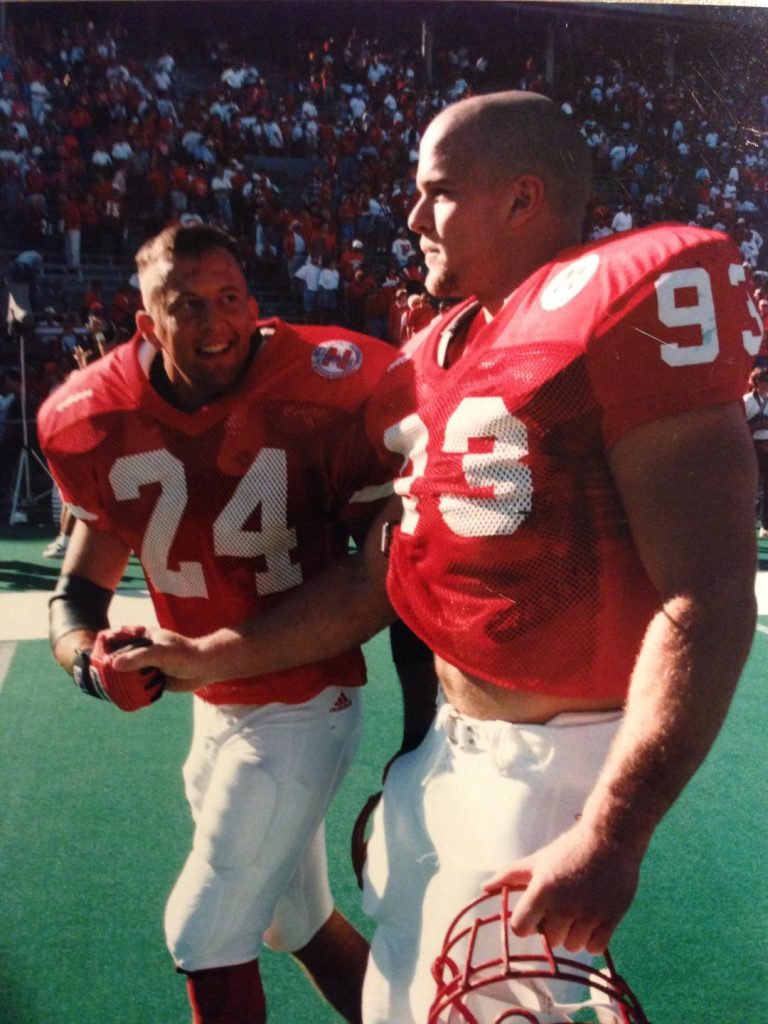Anatomy of an Era: Jared Tomich, Part 3

Excerpted from Chapter 71, No Place Like Nebraska: Anatomy of an Era, Vol. 2 by Paul Koch
Anatomy of an Era: Jared Tomich, Part 3
Q: Did your folks get to see many games?
Jared Tomich: They did, yes. They would always make it out to quite a few. And it was cool because we’d play Michigan State, which wasn’t too far to go for them, a couple games like that. They had the opportunity to come out quite a few times.
Q: Do you recall any of their recollections of the Husker home crowd?
JT: For them it was just overwhelming. When they would get my Grandma -when she was around, she was my biggest fan- they would literally be the first people sitting in the stadium. Every time they came to town they were the first people sitting in the stands.
Q: You knew where they were sitting, then?
JT: Oh yeah, and I knew when I was on the field. I could hear Grandma screaming. Undoubtedly.

Available on Amazon.com
Q: Any favorite practice stories worth repeating?
JT: Oh yeah, there’s a lot of those. You know, it was so funny, because we practiced the way we played. Coach Osborne was very, very big on that. We practiced full-bore. And that led to a lot of hot heads and emotions and things when Coach would let them cut-block us and things like that. We were constantly fighting the offensive linemen.
At times it was half-football and half-boxing, but that’s what got us ready for Saturday. Because if you watch any of our games, none of us were ever hotheads on the field. We never got penalties. We always drew penalties, but we never, we never did, because we practiced so hard against one another. The game wasn’t the toughest game of the week, on Saturday. Sometimes our toughest game of the week was on Tuesday when we practiced ones against ones.
Q: I keep on hearing that Jared, and don’t think the average fan could appreciate the intensity you guys practiced at.
JT: Oh yeah, and then Coach Osborne’s remedy to stop us from fighting was to have us running stadium steps. So when you ‘run stadiums’ and just go right back down into practice, you’re doing everything you can just to catch your breath and not pass out. So you stop fighting, you stop all of that. In the end, you’re just trying to remember your name let alone anything else, because you’re so dog-tired at that point.
Q: Remember going against anyone in particular those days?
JT: Oh yeah, especially when I was a junior and starting and have to go up against Zach Wiegert every day, and Brenden Stai, some of these guys were the best offensive linemen of their time. We just went at it, but then everybody got in the locker room and it was cool.
I’ve been on teams in the pros like that, and the guys get pissed when you practiced like that. I get to the NFL and I’m still practicing like that and they’d get pissed. They don’t want you practicing like that.

Q: I’ve never asked anyone this, but how was it determined whether you were a left side or a right side rush end?
JT: Wherever Coach Samuel put you. Grant got stuck on the right and I got stuck on the left from day one. And the funny thing was, when we tried to play the other’s spot we weren’t as strong as where they stuck us. They just knew. They were so good at identifying the talent that you had and exposing those talents. They put us where they thought it was best.
Q: Is there a difference between a blindside and a left side rush end?
JT: Oh yeah, a lot of it is just -especially if you’re someone who is right-hand dominant that’s going to play the right side- you’re trying to use your high-impact arm with your left arm, and if you’re a right-handed person that’s going to be your less strong arm. If I’m on the left-hand side being right-arm dominant, for me my biggest move was just a speed rush to a power move, because I could use my right arm and my strength in that arm much more efficiently.
Q: Interesting.
JT: It’s a completely different game when you put the other hand down.
Q: I’d assumed exactly the opposite.
JT: Not for me. And Grant might disagree because he was on that right side, because he was right handed. And when I got to The League I played three years at left end and then I started getting bumped around, so I spent time at tackle and at noseguard. I played all four spots during my pro career.
Q: Where? New Orleans, Green Bay, Kansas City?
JT: Yes.
Q: Any memorable off-field occurrences?
JT: We were always, the defensive line, we were always together. Jason and Christian and Grant and myself, we were all four of us together. The team, we didn’t just play and practice with one another, we hung out with one another, too. I don’t talk to hardly any of the guys I played with in The League, but I talk to a ton of guys from college. I talk to Matt Vrzal all the time, and Damon Benning and Jason and Grant. And Grant and I have our foundations together, so we still keep in really, really close touch.
Q: Hey, that’s another thing. Bryan Pruitt said I had to ask you about coming back home from a bowl trip without brakes.
JT: (laughs) That’s another thing. Well, Bryan grew up in Midlothian, Illinois, which is just twenty minutes from here, so we drove back together. And what’s funny, Bryan and I would play on Saturdays and then we’d go pheasant hunting all day Sunday, and that’s how we would get our bumps and bruises worked out, by walking fields all day on Sunday. We’d play a game Saturday night and the next morning before the sun came up we’d be in Johnson County or we’d go out to Hastings. We’d go all over and go pheasant hunting. We did that all season long.
But anyway, I had like an ’89 four-door Tempo -and my dad is a mechanic- and my brakes went out when I got back from the bowl game. Well, I didn’t have any money to get them fixed, to pay somebody to put brakes on my car, so Bryan and I came up with this great idea. He had this old ’76 Chevy Stepside with this great big old bumper on the back. And the Tempo was a stick, so that helped. So we drove from Lincoln, Nebraska to Chicago with no brakes in the middle of a snowstorm, and each of us had a CB radio. I’d be following him on the highway and when I got the speed up too fast and needed to slow down I’d buzz him and say, ‘Here I come,’ and I’d bump him (to slow my speed). (laughs)
And it took us twelve hours to get home! My parents were so hot! I cannot tell you how hot my parents were. But we made it and everything worked out good. We weren’t going to get a ticket for speeding, that’s for sure.
Q: That’s one for the books, Jared. Priceless! (laughs)
JT: Yeah, he and I need to catch up.
Q: I hear Christian was the one handing out nicknames to all the guys: Larry Townsend had “Black Steel.” Did you have any good nicknames?
JT: They always just harassed me because I lived in a trailer. I couldn’t afford a nice apartment like they had, so I lived in an 11’ x 55’ trailer. So I got all kinds of sh#! for that.
Q: Did anyone else live with you?
JT: It was my fiance at the time. I lived with her at the time, and unfortunately we got divorced right after going to the pros, but I lived with her at the time. But Pruitt lived right across the street from me, Countryside Estates. Oh, that’s awesome. (laughs)
Q: Now I have to ask you, was there anyone behind the scenes who perhaps never got their due, but played a huge role for you or the organization’s chemistry? Any names?
JT: Dennis (LeBlanc) and Keith (Zimmer). Yep, because they were the ones who had the responsibility to make sure we were doing what we were supposed to be doing to keep our grades up. And those two got harassed more than anybody else, because they didn’t have the respect of a coach. Obviously, we respected them because they were our counselors and things like that -and those two had to, for lack of a better word, put up with so much sh#1- and still did such a great job of keeping us all on the beaten path.
And for myself to go from failing in high school to the Dean’s List by the time I get out of college? It’s those two. The two of them, there’s not an award they can give them that would show the amount of gratitude that they should be getting from all of us.
Q: When you say that they caught a lot of crap, any prime examples?
JT: You know what, ask Jason and Christian about that one. Because they had to put up with so much sh#! from those two meatheads. They should be on vacation right now on those two knuckleheads’ tickets.
They were both very, very good to all of us. I don’t care what they got paid, their salaries never did reflect what they should have been paid. Ever.

Q: Do you ever get back to Nebraska?
JT: Yeah, I usually go to at least one game a year. And I try to get back at least once a year to do some hunting here and there. I grew up in Chicago, but my second home is Nebraska. I love going back there. And it’s been three years now, it’s called the Husker Hog Ride. I put it on and try to get some of the players to join along and ride. Jon Zatechka comes out, Jason Peter comes out, Grant comes out and some of the other players, as well.
What it is, the money goes towards my foundation, the Children’s Cancer Camp Foundation, and we have the Gridiron Gang Camp, which us two put on in St. Louis in the summertime where we take about 50 kids on a retreat for a week. And then I have another one in the winter called Circle of Friends with an ex-NFL player, Jerry Wuncsh, which we do up in Wisconsin. If you go to haloofhope.net, you’ll get a little more info on that.
Q: Wunsch? He played for the Buccaneers for a while, didn’t he?
JT: Yeah, for ten years. He’s a really good guy. I’ve done a bunch of stuff with him and Alstott and some of those guys.
Q: I was always a Buccaneers fan, so that’s pretty cool. Well, Jared, have we missed touching upon anything else that set those teams apart from others of their day?
JT: From my personal experience, it’s just the idea that whether you were one of the top college recruits in the nation or whether you were a Prop 48 walk-on, they gave you the tools and everything you needed to be successful people. From the time I was a Prop 48 walk-on to the time I was a two time All-American I was never treated any differently. It was an absolutely wonderful experience and I’m just unbelievably grateful to have had the opportunity to play with those coaches and those players from that era.
End conversation.
Like Sammy Kershaw’s 1993 country hit ‘She Don’t Know She’s Beautiful,’ Jared revealed a most indispensable insight into many a Husker player’s psyche, “..most of us thought of ourselves as just scrubs…we were walk-ons that weren’t touted at all in high school and didn’t have egos and those other things.” Some of these guys didn’t have a clue how good they could be, and as a result they lived out the axiom, ‘If it’s to be, it’s up to me.’ Let’s call it self-accountability. To their benefit, the gamut of support services and dedicated, servant-minded staff ensured the opportunity for improvement and raised expectations in all areas for each youngster, “..they gave you the tools and everything you needed to be successful people.” Jared, it should be noted, wielded the full array of that toolbox like a true craftsman in earning Dean’s List honors, All-American football recognition, and a diploma. It should make Nebraska fans proud, and give everyone pause when it comes to judging the capabilities of partial qualifiers and their success potential in a collegiate athletic setting.
I don’t wish to belabor the point, but hearing it from a guy who had not only the ‘motor’ and played in the pros (and teaches them as well), we may as well assume what everyone has told us about their practice intensity to be Gospel truth. ”..we practiced the way we played… We practiced full-bore. And that led to a lot of hot heads…We were constantly fighting the offensive linemen… but that’s what got us ready for Saturday.” Come 1993 every player in the organization was a “Want to be” and not a “Have to be,” which gave way to the coaches freely pushing them harder, faster, further than they had ever done previous. The result was perfection par excellence.
In ending this chapter, it’s implicit that we come away with a firm understanding Jared’s three keys for Nebraska success: The coaching staff’s “humility, creativity…and rah-rah.” Exhibiting uniquely, personally manifested measures of each of these three keys, Offensive Coordinator Tom Osborne and Defensive Coordinator Charlie McBride both contrasted each other and, “complemented each other so well.” (We know who possessed a greater degree of ‘rah-rah’ by now, don’t we?) It’s a testament to their humility that they were not only able, but willing, to make adjustments to their game plans. It wasn’t about them as coaches, but about ensuring the team was provided every available opportunity for victory given how hard they’d worked the many previous weeks. To do otherwise would have been selfish, showed poor leadership, and been proven quite uncaring. We all know the old saying, “They don’t care how much you know until they know how much you care.” Jared said it best in his, “Coach Osborne and Coach McBride? The whole organization, you felt like they cared.” Even if they sometimes had funny ways of showing it.
Notable quote #2:
Jared Tomich on the benefit of the high intensity practices: “..none of us were ever hotheads on the field. We never got penalties. We always drew penalties, but we never, we never did, because we practiced so hard against one another.”
Copyright @ 2013 Thermopylae Press. All Rights Reserved.
Photo Credits : Unknown Original Sources/Updates Welcomed
Author assumes no responsibility for interviewee errors or misstatements of fact.